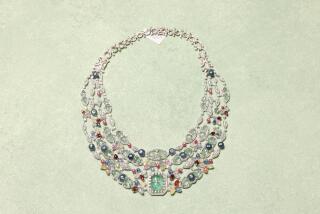Diamonds in the Rough Are His Business
- Share via
RIDGEWOOD, N.J. — In the private and mysterious world of high-powered jewelry dealing, Arthur Groom stands out like a diamond in the rough.
Groom, 39, whose firm sold $12 million worth of diamonds and other gems last year, frequently travels to jungles, cavernous mines and other remote spots in Asia and Africa in a constant search for the world’s rarest rocks.
Like the sailing merchants of centuries past, Groom will barter and trade for many of his stones. He recently swapped a shipload of cement for $1 million worth of diamond “roughs” from the African nation of Sierra Leone.
Groom seeks stones in dangerous, strife-ridden nations, such as Myanmar (formerly called Burma), where he says he is only the third American since 1962 to gain the rights to deal in rubies. Most recently, Groom closed a deal to become the sole distributor of American soft drinks in that Southeast Asian nation. He plans to repatriate the profits in gems.
Modern Indiana Jones
And while most diamond dealers prefer to keep their actions cloaked in secrecy, Groom, who is outspoken and friendly, seeks the spotlight. He employs a publicist who pitches Groom as a modern-day Indiana Jones.
“There have been very few dealers who are so public,” said Abe Michael Shainberg, executive director of New York’s exclusive Diamond Dealers Club, considered the world’s most important diamond exchange. “The average diamond dealer, for security reasons, does not want such publicity.”
He described Groom as “an honest and honorable man. His publicity is good for his business, and good for the rest of us, too.”
Seated in a small office at his fashionable store in the New York suburb of Ridgewood, Groom proudly showed off stones with $100,000 price tags. The shirt-sleeved man, who wore no jewelry, smiled and insisted he is “not Indiana Jones.”
“No intrigue,” he said. “But I do have a message.”
Groom says American business can exert a positive influence throughout the world. He is convinced that the world respects the American system but that Americans must also understand and respect other cultures.
“In many cultures, the American way does not hold up,” he said. “How dare we have that attitude that ours is the only way.”
Groom’s story, however, is the stuff of the American dream. He left a successful job as a stockbroker for Merrill Lynch & Co. 15 years ago after a friend’s father urged him to take a gem course that left him “absolutely fascinated” with precious stones.
Frequent Flier
Groom said he struggled at first, working 15-hour days in a one-room enterprise as his friends climbed their respective corporate ladders. Arthur Groom & Co. in Ridgewood and his American Trading Co. in New York slowly grew into a multimillion-dollar-a-year business with offices around the globe.
Unlike some dealers who only work the phones, Groom goes directly to faraway mines to pick out his own stones and diamond roughs. One of the few dealers who sells both diamonds and other gems, Groom is the consummate frequent flier, logging more than 150,000 miles each year.
Groom said he draws energy from his work.
“There’s a science to picking stones in the jungle,” he said. “Then you go to the Diamond Dealers Club and pull up your shirt sleeves and wheel and deal. Some Saturdays, I’ll simply work the floor of this store, helping an old lady who needs a $10 soldering job on a broken chain.”
His ruby deal with Myanmarbrought Groom face-to-face with military leaders of a nation that was virtually shut off to American businessmen since its 1962 coup. The Myanmar rubies, Groom said, are the rarest and most desirable stones in the world, retailing for about $10,000 a carat.
When asked if dealing with Myanmar’s harsh government tugged at his conscience, Groom nodded.
“But I’ll be putting 1,200 people to work in the soft-drink bottling plant. I really believe we should be there to have a presence.”
Groom said he was moved by the poverty in many African nations. He said he believes that trading cement, food and clothing for gems will make a difference there.
“It’s easy to pay cash,” Groom said. “But what good does it do for those countries? Who gets the money? These people need so much.”
More to Read
Sign up for Essential California
The most important California stories and recommendations in your inbox every morning.
You may occasionally receive promotional content from the Los Angeles Times.










